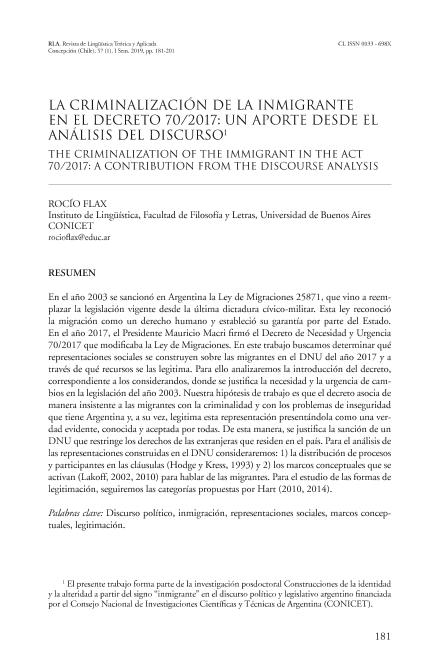Artículo
En el año 2003 se sancionó en Argentina la Ley de Migraciones 25871, que vino a reemplazar la legislación vigente desde la última dictadura cívico-militar. Esta ley reconoció la migración como un derecho humano y estableció su garantía por parte del Estado. En el año 2017, el Presidente Mauricio Macri firmó el Decreto de Necesidad y Urgencia 70/2017 que modificaba la Ley de Migraciones. En este trabajo buscamos determinar qué representaciones sociales se construyen sobre las migrantes en el DNU del año 2017 y a través de qué recursos se las legitima. Para ello analizaremos la introducción del decreto, correspondiente a los considerandos, donde se justifica la necesidad y la urgencia de cambios en la legislación del año 2003. Nuestra hipótesis de trabajo es que el decreto asocia de manera insistente a las migrantes con la criminalidad y con los problemas de inseguridad que tiene Argentina y, a su vez, legitima esta representación presentándola como una verdad evidente, conocida y aceptada por todas. De esta manera, se justifica la sanción de un DNU que restringe los derechos de las extranjeras que residen en el país. Para el análisis de las representaciones construidas en el DNU consideraremos: 1) la distribución de procesos y participantes en las cláusulas (Hodge y Kress, 1993) y 2) los marcos conceptuales que se activan (Lakoff, 2002, 2010) para hablar de las migrantes. Para el estudio de las formas de legitimación, seguiremos las categorías propuestas por Hart (2010, 2014). In the year 2003 Migration Law No. 25871 was passed in Argentina. This law replaced the legislation in force since the last civic-military dictatorship and recognized migration as a human right, establishing guaranties by the Government. In 2017, President Mauricio Macri issued Act No. 70/2017 as a modificatory of the Migration Law. In this work, we seek to determine what social representations are constructed about immigrants in the Act of 2017 and what resources are used to legitimize them. We will analyze the introduction of the Act, the general considerations, which justify the need and urgency of changes in the legislation of 2003. Our working hypothesis is that the Act insistently associates immigrants with criminality and the insecurity feeling present in Argentina at that moment, and in turn, legitimizes this representation by presenting it as an evident truth, known and accepted by all. Therefore, the Act restricts the rights of foreigners residing in the country and shows this restriction as justified. For the analysis of the representations we will consider: 1) the distribution of processes and participants in the clauses (Hodge and Kress, 1993) and 2) the conceptual frames that are activated (Lakoff, 2002, 2010) to talk about the immigrants. For the study of forms of legitimation, we will follow the categories proposed by Hart (2010, 2014).
La criminalización de la inmigrante en el decreto 70/2017: UN aporte desde el análisis del discurso
Título:
The criminalization of the immigrant in the act 70/2017: A contribution from the discourse analysis
Fecha de publicación:
01/2019
Editorial:
Universidad de Concepción
Revista:
Revista de Lingüística Teórica y Aplicada
ISSN:
0718-4883
Idioma:
Español
Tipo de recurso:
Artículo publicado
Clasificación temática:
Resumen
Archivos asociados
Licencia
Identificadores
Colecciones
Articulos(SEDE CENTRAL)
Articulos de SEDE CENTRAL
Articulos de SEDE CENTRAL
Citación
Flax, Rocío; La criminalización de la inmigrante en el decreto 70/2017: UN aporte desde el análisis del discurso; Universidad de Concepción; Revista de Lingüística Teórica y Aplicada; 57; 1; 1-2019; 181-201
Compartir
Altmétricas




